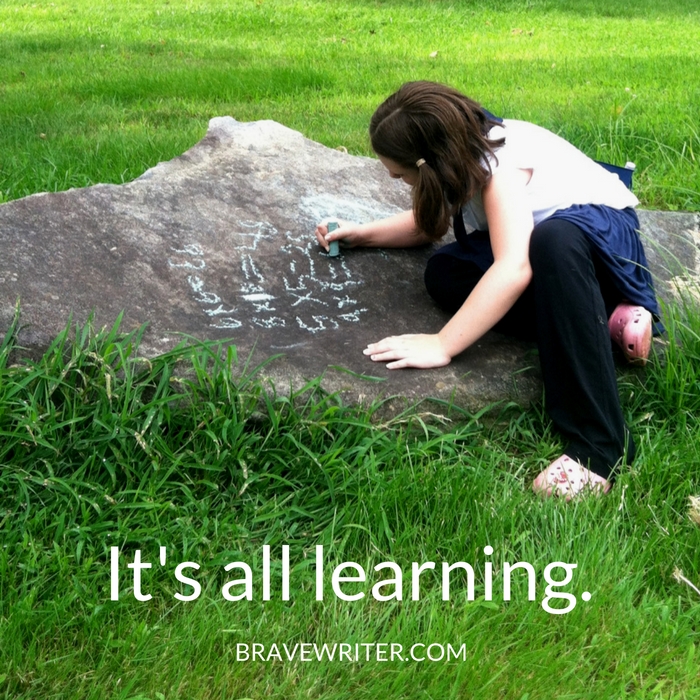It’s All Learning, All the Time

Don’t let anyone tell you differently.
You kept your kids home because you believed that this educational choice was best for whatever reasons seemed right to you for your family.
Because it seemed right to you at the time, it became right for you in time.
Despite early success, home education isn’t always successful in all the ways we want it to be. What we knew when we started can’t account for all the challenges we eventually face. Over time, we notice our particular kids push through the cracks of our vision.
On that day—the day that comes for us all—we reevaluate everything!
Is home education the best? Is THIS STYLE of home education the right one? What am I missing? What am I doing wrong?
The sorting and sifting begin.
- Can I put my child in X program and still retain the benefits of home education?
- What happens if I use the public schools? Am I betraying my values?
- I’ve taught my child to write this way, but now wonder if I’ve shortchanged that child by not using this other method that seems to work well for my best friend.
- I’m exhausted: what method keeps my values but frees me from being the primary teacher of my children?
- Oh no! High school! Shouldn’t we be doing more than reading aloud and math pages? Will my kids be ready for college?
- If I don’t follow every guideline for unschooling, does that mean I’m not an unschooler? Does that mean it won’t work?
These thoughts, these re-evaluations are absolutely 100% normal and right! You are not beholden to any system of education; you don’t owe any philosophy of education loyalty.
Good lessons can be learned in any context.
- It’s valuable, for instance, to know how to use a Scantron or how to log into an online classroom before college.
- It’s good to know how to manage the demands of multiple instructors for a variety of subjects.
- It’s helpful to learn how to “pull up a grade” after it has slipped.
- Studying the classics after being obsessed with modern literature will yield great results. But so will reading modern lit after devoting yourself to the classics.
If you have a “nagging” doubt about some subject area, why wouldn’t you take a risk and cross-pollinate? You’re not betraying your loyalty to a brand or product or philosophy to see if you can find another way to learn that adds dimension and depth to your child’s education.
I remember sending Caitrin to the local high school three years ago. Unlocking a locker, navigating a huge set of halls, keeping up with homework, asking for help from teachers, working with other students in partner projects, and improving a grade through extra diligence were valuable lessons to her, in addition to math, French, social studies, and English. We’d already taught her to write, think deeply, calculate, and teach herself anything she wanted to know at home. These have traveled well with Caitrin through public high school, where she’s learning an entirely different host of valuable skills for college and life.
Noah, on the other hand, learned a different lesson: that the style of education in public school is not how he learns. Good to know, too!
If you go from unschooling to a curriculum or you move from Charlotte Mason style learning to text books or you join a co-op after going it alone for years—learning will happen. Guaranteed!
Your kids will learn skills you forgot they might need later, you’ll discover what kind of learner that child is in a whole new way, and you’ll find yourself discovering new ideas/strategies about education through this new prism.
You can’t fail. You know why? Because you are so passionate about your children, you won’t let that happen. You’ll tweak and re-evaluate again and grow and re-imagine. There’s no one way to educate or raise good people.
There is one way to ensure they do turn out well…
love, love, love + adjust, adjust, adjust
I’ve met unschooled kids who are woefully behind their peers academically but are delights to be with, and I’ve met unschooled kids who blow my mind with their self-taught ingenuity but are awkward socially.
I’ve taught public schooled kids who can write circles around plenty of home educated kids, and I’ve taught public schooled kids who have never been taught to think original thoughts and who’ve missed the chance to discover learning as pleasure rather than a source of grades.
All systems and philosophies have their limits. The limits live in human beings. We have our biases, our particular set of experiences that yank our attention in a direction that is meant to address worries and fears but that overlook other valuable ideas and strategies.
You won’t damage anyone if you stay flexible, open-minded, and loving. If you treat each opportunity or choice as an adventure in learning rather than a capitulation to some sub-standard value system, you’ll find the good in each experience.
You can always stop, quit, throw out the book. If you keep thinking, “I’ve got to try this other writing program,” why wouldn’t you? Find out! Sate your curiosity! See if it contributes something you aren’t getting right now.
Ideology cannot create health. Responsiveness to your family’s needs as they become apparent to you, can.
Considering all options helps.
Being beholden to no one—valuable.
Try something new—the thing that’s gnawing at you. See how it goes. Give it a college-try. If it’s not working, change. But if it does work, don’t judge yourself. Let it be a new learning experience for all of you.
Be gentle with yourself.
Your worries are well-founded and tell you what you need to know so that you and your children will grow, grow, grow…and learn, too.



















be a smart person and you will find an exact and right key to a thesis on learning troubled teens